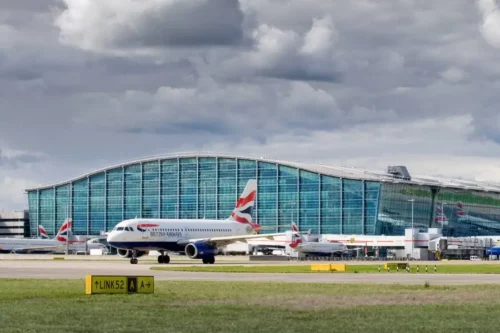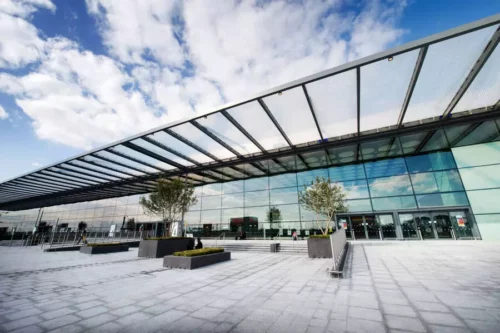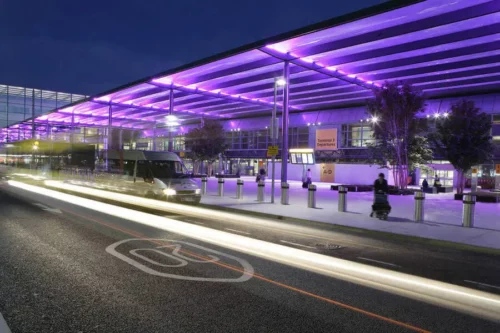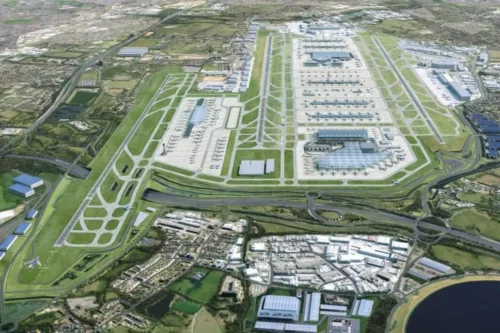Rachel Reeves backs a third runway at Heathrow – this is what the industry had to say
Links on Head for Points may support the site by paying a commission. See here for all partner links.
As I’m sure you’ve seen by now, and as has been widely teased in the press for weeks, Rachel Reeves (finally?) threw her weight behind Heathrow’s third runway yesterday.
This is more of a symbolic move than a practical one. In theory, expansion at Heathrow already has the green light following a Supreme Court ruling in December 2020 that overturned the Court of Appeal’s block on environmental grounds.
However, the covid pandemic placed a big question mark over the plans. Heathrow has yet to apply for a Development Consent Order allowing it to compulsorily purchase any required land for the ‘Nationally Significant Infrastructure Project’.
Then, just as Heathrow was picking up speed again after covid, John Holland-Kaye decided to call it quits after a decade and resigned as CEO. Thomas Woldbye, formerly CEO of Copenhagen Airports, took over.
For the past year and a half, Woldbye has kept a low profile. More recently, when pushed on whether he would press ahead with a third runway, he said he would require a clear signal from Government to back it:
“We can’t do that just as a single company. We are the tactical executors on the plan but transportation strategy is a government issue.”
“It would be my ambition that, by the end of next year [2025], we will have taken a decision. Otherwise, we keep on talking about it and spending money and time and effort on it, and I think that’s not worth it.”
It seems Rachel Reeves heard him loud and clear.
What could a third runway look like?
At this stage, we don’t know. In 2014, Heathrow settled on a £14 billion masterplan that involved building a third runway to the north west of the existing airport, over the M25. When it was announced, airlines and industry baulked at the cost, which was to be recovered through the ‘Regulatory Base’ that enables Heathrow to pass on costs to airlines.
Hotelier Surinder Arora, who owns the Arora Group and operates many of the hotels at Heathrow, made a counter proposal in which he outlined how he thought a third runway could be delivered “cheaper and better” and without having to build over the M25.
Hopefully, with the Government now backing the project, Woldbye and his team will be able to provide clarity on what they hope to achieve and how.

What does the industry think?
It’s been an entertaining day seeing companies left, right and centre jumping on the bandwagon of Heathrow expansion and economic growth. As the two largest customers both BA and Virgin Atlantic have naturally issued statements, as has Heathrow itself.
My inbox has also been swamped with commentary from other airports, including Manchester Airport Group and Southend. Meanwhile Ryanair CEO Michael O’Leary, never one to back down from an opportunity to bang his own drum, has also weighed in.
Here are what they all have to say.
Heathrow CEO Thomas Woldbye called for a reform of the regulatory model:
“We welcome the Chancellor’s support for the aviation industry and recognition of the critical role we play for the economy and in delivering growth across the UK.
“Heathrow is the UK’s gateway to growth and prosperity. A third runway and the infrastructure that comes with it would unlock billions of pounds of private money to stimulate the UK supply chain during construction. Once built, it would create jobs and drive trade, tourism and inward investment to every part of the country. It would also give airlines and passengers the competitive, resilient hub airport they expect while putting the UK back on the map at the heart of the global economy. With strict environmental safeguards, it would demonstrate that by growing our economy responsibly we can ensure our commitments to future generations are delivered.
“This is the bold, responsible vision the UK needs to thrive in the 21st century, and I thank the Government and Chancellor for their leadership. It has given us the confidence to confirm our continued support for expanding Heathrow.
“Successfully delivering the project at pace requires policy change – particularly around necessary airspace modernisation and making the regulatory model fit for purpose. We will now work with the Government on the expected planning reform and support Ministers to deliver the changes which will set us on track to securing planning permission before the end of this Parliament.”

IAG, owner of British Airways, did the same:
“We welcome the Government’s support for airport expansion and recognition of the key role it plays in driving growth, and we agree with the Chancellor that expansion must be affordable and sustainable. We also need to change the current regulatory model that has allowed Heathrow to become the most expensive airport in the world and we look forward to working with the Government, the CAA and Heathrow on fixing this for consumers.”
This isn’t surprising, of course. As the holder of 51% of Heathrow slots, the cost of building the third runway would be disproportionately passed to BA under the current funding model, even though there is no guarantee it would receive additional slots.
Shai Weiss, CEO of Virgin Atlantic, agreed:
“Heathrow is our home and the UK’s only hub airport, so I took great interest in today’s update from Chancellor Rachel Reeves on London airports expansion.
“A thriving aviation sector is crucial to the success of the Chancellor’s growth agenda and all of us in the UK. Heathrow is critical national infrastructure, enabling connectivity and trade to global markets, yet it remains the world’s most expensive airport with a service that falls short.
We are supportive of growth and expansion at Heathrow, if, and only if, there is fundamental reform to the flawed regulatory model to ensure value for money for consumers, affordability for UK plc and which supports a competitive and thriving UK aviation industry.
“As UK Government supports growth across London airports it’s imperative that HMG takes action to create a thriving UK Sustainable Aviation Fuel (SAF) industry, one of the main levers we have to decarbonise long-haul aviation, as our historic Flight100 proved. We should not be in a position where there is a choice between growth or sustainability. For the UK this is a question of “and” not “or”. A pathway to Net Zero 2050 exists and our industry is committed to achieving it.”
Weiss has previously suggested that the price of Virgin Atlantic’s support would be the completion of the extended Terminal 2, specifically designed to accommodate the airline.

Manchester Airports Group backed the third runway and highlighted its own investments across airports in the UK:
“MAG welcomes the Chancellor’s recognition of the pivotal role airports have to play in kick-starting the economy and raising living standards across the UK. Her positive approach to planning is good news and reflects the urgency of her growth mission.
“As an island trading nation, we need ever better connections with the world and thriving airports in all parts of the country. That means backing our aviation sector while helping it achieve its net zero targets.
“We can start by maximising the potential of existing runways across the UK. At MAG, we plan to invest £2.5bn in Manchester, London Stansted and East Midlands over the next five years – the largest private investment in transport infrastructure outside the M25. That will create jobs, drive trade and attract immediate inward investment in the North, South and Midlands.
“A prime example is our partnership with Prologis at East Midlands Airport. It will unlock £1bn of further investment and attract global advanced manufacturing and logistics businesses to the region, creating up to 2,000 jobs.
“We need a policy environment that encourages private investment in airports and will work with Government to ensure we all maximise the contribution aviation makes to its economic vision for everyone in the UK.”
Michael O’Leary, CEO of Ryanair, said he could deliver passenger growth in the UK “immediately” if the Government scrapped Air Passenger Duty:
“Ryanair could be growing more rapidly to/from the UK, but Rachel Reeves bizarre decision to raise APD taxes by £2 per passenger damages the growth prospects of the UK, and in particular regional UK airports. Rachel Reeves is trying to distract people by floating a 3rd runway at Heathrow (or a 2nd at Gatwick), which even if approved, won’t arrive for 10 or 20 years, long after the life of this Labour Govt.
If she is serious about delivering growth, then she should abolish the penal and damaging APD tax, which makes the UK uncompetitive when EU countries like Sweden, Hungary, Ireland, and regions in Italy are abolishing aviation taxes, and winning dramatic traffic, tourism, and jobs growth from the UK.
“If Rachel Reeves is serious about growth, then stop wasting time talking about a 3rd runway at Heathrow (which won’t deliver till 2030 or 2040), and instead do something useful to drive growth during the life of the current Labour Govt and abolish APD.
This would deliver dramatic investment and growth in air travel, tourism, and economic activity, not just in London but across the UK regions. Sadly to date, the Labour Govt has raised taxes while it rewarded train drivers and junior doctors, but damages economic activity and growth with this APD tax hike.”
Kenton Jarvis, CEO of easyJet, said it would present a unique opportunity for easyJet:
“I welcome the Government’s pro-growth agenda and their recognition of the importance of aviation and the crucial role it plays as an enabler of economic growth. As an island nation, this industry provides much-needed connectivity as well as creating many skilled jobs which contribute to the wider prosperity of the country.
“Expansion at Heathrow will provide consumer and economic benefits and represents a unique opportunity for easyJet to operate from the airport at scale for the first time and bring with it lower fares for consumers.”
What is abundantly clear is that neither Heathrow, nor its two biggest customers, are happy with the way the airport is funded under the current ‘regulatory model’ in which the Civil Aviation Authority mediates a per passenger fee based on airline and airport input. The problem is that there is no agreement on an alternative, such as breaking up the airport by selling individual terminals to the highest bidder.
I didn’t see any response from London Gatwick. In theory Gatwick will receive permission to build a second runway next month and can complete the work by 2030. No extra land is required and all it involves is moving the current spare runway 12 metres to the north to allow parallel operation. Will it proceed if virtually all of its customers are committed to moving to an expanded Heathrow in the 2040s?










Comments (213)